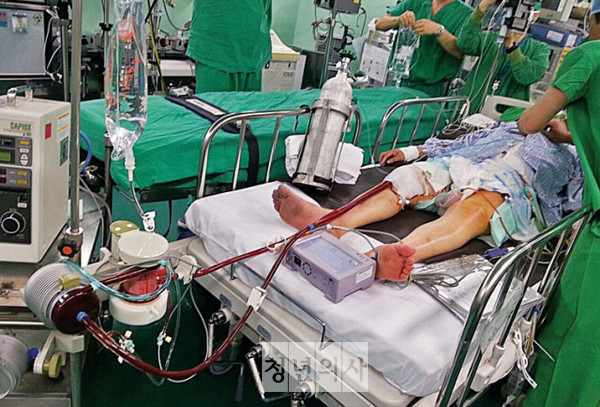With the unrelenting fourth wave of Covid-19, the number of critically ill patients receiving extracorporeal membrane oxygenation (ECMO) hit a record high on Tuesday, and this lifesaving treatment is in shortage in some regions.
According to the Korean Society for Thoracic & Cardiovascular Surgery (KTCS), 37 Covid-19 patients were on ECMO as of Tuesday, the highest number since the KTCS started collecting ECMO data in September 2020. Most of the patients on ECMO were in their 50s or younger.

Among the 37 patients, 29 or 78.4 percent were hospitalized in Seoul or Gyeonggi Province. As the number of severely ill Covid-19 patients increased, ECMO machines have become insufficient in some hospitals in greater Seoul, which had to borrow them from other regions, the KTCS said.
The nation has 383 ECMO machines, and 95 of them are used to treat patients in thoracic surgery.
The shortage of ECMO is related to the spiking of Covid-19 cases in the Seoul metropolitan area. About 55 percent of new cases occur in the Seoul and Gyeonggi region.
According to the Korea Disease Control and Prevention Agency (KDCA), Korea had 1,776 new daily cases at midnight on Wednesday, pushing the total caseload to 205,702. In just four months, the accumulated number of Covid-19 cases more than doubled, and 30 days have passed since the daily cases surpassed the 1,000 mark.
The number of seriously ill Covid-19 patients also surged to 369 on Wednesday midnight, up 40 from a day earlier.
Compared to a month ago, the number was more than two folds higher. On July 1, there were 144 severely ill Covid-19 patients.
The KTCS warned that people have to take the resurgence of Covid-19 very seriously. The group also predicted that more patients will receive ECMO than now, soon.
Physicians turn to ECMO when medications or ventilators do not improve the patient’s conditions.
Kim Woong-han, chairman of KTCS, said the upward trend in the number of ECMO-reliant patients could be a significant indicator in the fourth wave of the pandemic. “Statistics in the past showed that the number of patients on ECMO rises about two weeks after the Covid-19 epidemic cycle,” Kim noted.
He worried that a record-high number of Covid-19 patients were receiving ECMO on a rising curb and said this kind of situation was unprecedented.
As Covid-19 daily cases continue to surpass 1,500, the number of patients on ECMO has yet to reach a peak, Kim went on to say, adding that the nation needs to brace for additional demand for ECMO machines.
While ECMO was used mainly for seniors last year, the trend has changed. The proportion of young patients using ECMO went up recently, he said.
“This proves that Covid-19 is not a mild disease. Therefore, we need to be alert,” he added.
Another expert said the government needs to educate more people about using ECMO and establish a transfer system. ECMO requires specialists in thoracic surgery, pulmonary medicine, intensive care, and extracorporeal circulation specialist.
There are 220 extracorporeal circulation specialists in Korea.
“As experts have pointed out several times, we need to prepare in advance for large-scale regional outbreaks,” said Kim Jae-bum, a professor at the Department of Cardiothoracic Surgery of Keimyung University Dongsan Hospital.
Hospitals in some Gyeonggi areas may not be able to receive Covid-19 patients requiring ECMO, he said.
Kim urged the government to prepare staff, set up a control tower, and build a system to manage ECMO patients as soon as possible.
“If confusion takes over, patients and physicians will have to sacrifice,” he warned.
Kim oversaw ECMO treatment when Covid-19 cases surged in Daegu and neighboring cities in North Gyeongsang Province last year.

